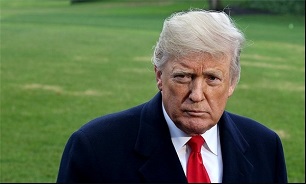Trump's Iran Comments Prompts Condemnation by Iraqis
 US troops do not have the right to use Iraq to "watch Iran," Iraqi President Barham Salih said on Monday after Donald Trump indicated American forces were there to do just that.
US troops do not have the right to use Iraq to "watch Iran," Iraqi President Barham Salih said on Monday after Donald Trump indicated American forces were there to do just that.
"We are surprised by the statements made by the US president on the presence of US troops in Iraq," Salih said at a forum in Baghdad. "Trump did not ask us to keep US troops to watch Iran."
In an interview that aired Sunday, Trump said it was important to keep a military presence in Iraq so Washington could keep on eye on neighboring Iran.
The Iraqi president said US troops had no right to monitor Iran under the agreement between the two nations, and that their specific mission was to combat terrorism. He added that he would wait for clarifications from Washington on the numbers and nature of the US troops' mission in his country.
"Those forces do not have the right to monitor many things, including watching Iran. We will not allow this," he added.
Other Iraqi officials and politicians also severely reacted to Trump's remarks.
Hassan al-Kaabi, the first deputy speaker of the Iraqi parliament, issued a statement Sunday saying parliament would work on a bill to end the presence of US troops in the country in its next session.
"All parties need, as soon as possible, to stop the US presence and not allow Iraq to be used as a springboard for aggression or surveillance of any state," the statement read.
Also, former Iraqi Prime Minister Haider Al-Abadi tweeted in English on Monday that "Iraqi sovereignty must be respected".
"Its interests should not be compromised. Iraq should not be used as a spring board to attack its neighbors. We are not proxies in conflicts outside the interests of our nation," he wrote.
Also, Ammar al-Hakim, a Shiite leader in the Parliament, wrote in a twitter statement that “we strongly reject having Iraq be a place for settling regional or international scores or a place to provoke neighboring states".
“Making our land into a place to attack neighboring states is a threat to our national interests and our Iraqi security,” he added. “Iraq will not allow this.”
Meantime, Hashim al-Mousavi, the spokesperson for Iraq's al-Nujaba Movement, called on the Iraqi government to adopt a clear position against Trump's remarks, demanding the parliament to hold a session to teach the US the meaning of freedom, independence and sovereignty.
"Iraq is not a servant to the US and we do not want war either but we do not fear war and it is our right to defend the Iraqi people and sovereignty," he added.
Also, Jaafar al-Husseini, a spokesman for the Iraqi pro-government Kata'ib Hezbollah voluntary forces, warned the Trump administration against mounting offensives against Iran and Syria from Iraq.
He also called on parliament to speed up legislation to drive out foreign forces, warning that the anti-terror force won't wait long.
The spokesman noted that Iraq's security agencies should deem American military forces as "appropriate targets" as Iraqi resistance groups already do.
Meantime, Qais al-Khazali, the leader of Asaib Ahl al-Haq, said Monday that Iraqis can use the legislature to enforce a reduction of American forces.
“Iraq has forces . . . that can remove American forces from Iraq — no matter they are 5,000, 7,000 or even 9,000 soldiers — in one dark night,” Khazali said.
Also, Thamer al-Zaiban, a member of Iraq's Fatah movement, dismissed any possibility for other states to use Iraq's soil for attacks on the neighboring states.
"All political spectra, including al-Fatah will not allow Washington to use the Iraqi soil for attack or spying on neighbors," he said.
Trump’s visit to al-Asad airbase in December provoked similar anger from Iraqi politicians, some of whom called it an arrogant affront that recalled American behavior dating back to the 2003 invasion and what followed: the abuses at Abu Ghraib prison; incidents with civilian casualties; and widespread sectarian violence.
Message end/
